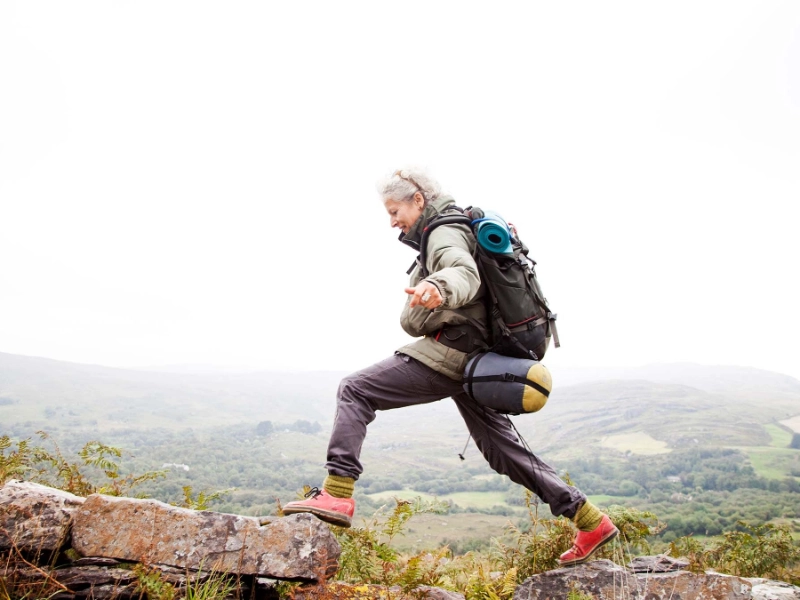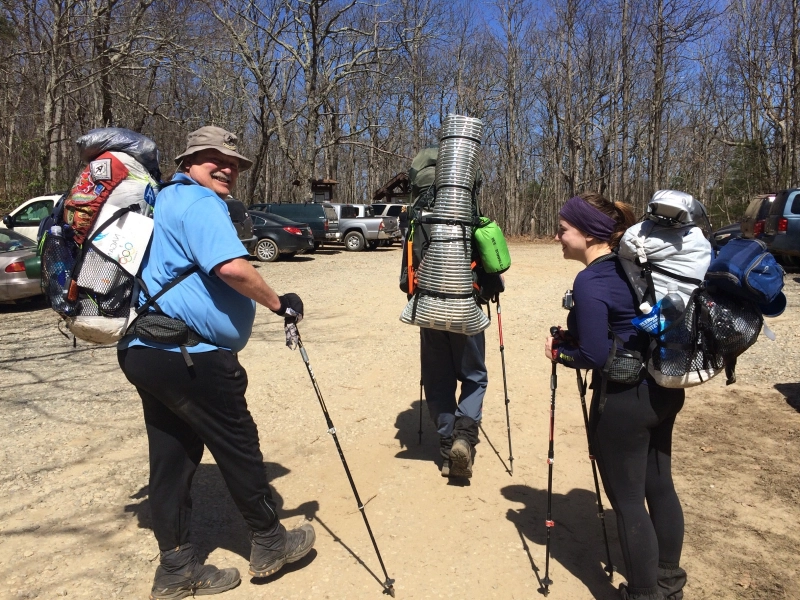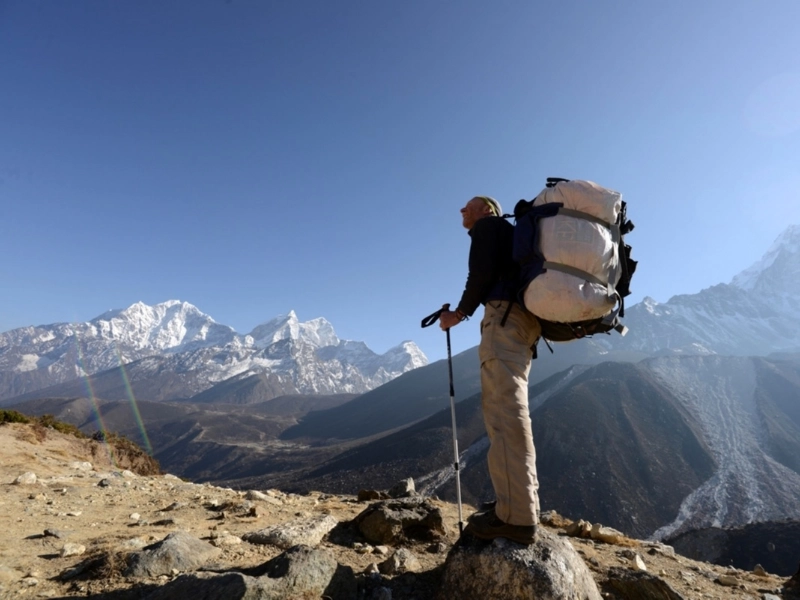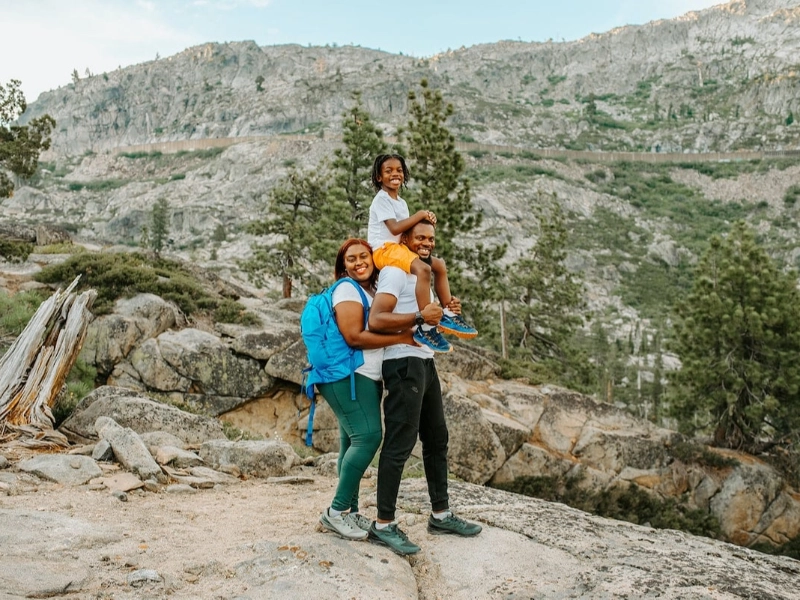A lot of hikers hike well into their 70s, 80s, and beyond. Injury avoidance is essential for senior hikers. This can involve carrying a high-quality backpack and engaging in some focused strength exercise. Notifying someone where you are hiking is also crucial, particularly if you are going there alone. This will lessen the likelihood of someone becoming lost in the woods.

 A thru-hiker's age ranges from about 25 to about. Many people nowadays are physically and financially capable of embarking on a long-distance trekking route. Hiking is not exclusively appropriate for young people, though. For example, people have finished the Appalachian Trail who were sixty or seventy years old.
Hikers should be in good physical shape, with particular attention to their hips, ankles, and knees. Depending on the terrain, they should also be able to walk 10 to 20 miles every day.
People who finish the Appalachian Trail are frequently referred to as "thru-hikers." Some of the most dedicated hikers aim to complete the three major trails: the Appalachian, Pacific Crest, and Continental Divide. The achievement of a triple crown, as it is called, in a single year is an extremely rare event. Hiking allows thru-hikers to get outside and take in the unadulterated beauty of nature.
A thru-hiker's age ranges from about 25 to about. Many people nowadays are physically and financially capable of embarking on a long-distance trekking route. Hiking is not exclusively appropriate for young people, though. For example, people have finished the Appalachian Trail who were sixty or seventy years old.
Hikers should be in good physical shape, with particular attention to their hips, ankles, and knees. Depending on the terrain, they should also be able to walk 10 to 20 miles every day.
People who finish the Appalachian Trail are frequently referred to as "thru-hikers." Some of the most dedicated hikers aim to complete the three major trails: the Appalachian, Pacific Crest, and Continental Divide. The achievement of a triple crown, as it is called, in a single year is an extremely rare event. Hiking allows thru-hikers to get outside and take in the unadulterated beauty of nature.
 For people of all ages, hiking is a popular hobby, with men making up the majority of hikers. But the tide is turning, and a lot of female hikers have just as much fun as their male colleagues. Long-distance hikers range in age from 30 to 49 on average, though survey results can vary.
A twentysomething with some outdoor experience and decent physical conditioning is the archetypal hiker. On the other hand, thru-hikers are a fairly diverse bunch of people from various backgrounds.
Hiking is without a doubt a strenuous activity. It's not just a physically demanding workout; it also calls for a strong will and strong mentality. Thus, it's critical to comprehend what drives hikers to partake in such a strenuous sport. Hikers who hike for extended periods of time include a distinct group of people who log thousands of kilometers annually. This study investigates the mental health and intrinsic hiking motivation of this distinct community.
For people of all ages, hiking is a popular hobby, with men making up the majority of hikers. But the tide is turning, and a lot of female hikers have just as much fun as their male colleagues. Long-distance hikers range in age from 30 to 49 on average, though survey results can vary.
A twentysomething with some outdoor experience and decent physical conditioning is the archetypal hiker. On the other hand, thru-hikers are a fairly diverse bunch of people from various backgrounds.
Hiking is without a doubt a strenuous activity. It's not just a physically demanding workout; it also calls for a strong will and strong mentality. Thus, it's critical to comprehend what drives hikers to partake in such a strenuous sport. Hikers who hike for extended periods of time include a distinct group of people who log thousands of kilometers annually. This study investigates the mental health and intrinsic hiking motivation of this distinct community.
 In addition to being a great way to be active and healthy, hiking works a different area of your brain. It's a challenging pastime that calls on the capacity to maneuver in an unpredictable natural setting. Hiking paths can be altered by uneven terrain, gnarly branches, and unseen hazards. Hiking requires you to constantly modify your path on both a micro and macro level, which helps to maintain mental acuity as you age.
According to a survey of long-distance hikers, a variety of reasons, including a desire to become closer to nature, the desire to conquer new obstacles, and a desire to push the limits of their physical capabilities, drove them to take up hiking. Social interaction and the desire to be a part of a hiking community with like-minded people were two more factors.
Spring is the most popular season to trek, with summer and winter following closely behind. Starting in early March or early April, thru-hikers usually increase their daily mileage throughout the course of their journey. They frequently have "trail legs" by the time they get to Virginia, which allows them to travel far more miles each day than those who begin their thru-hikes later in the year.
In addition to being a great way to be active and healthy, hiking works a different area of your brain. It's a challenging pastime that calls on the capacity to maneuver in an unpredictable natural setting. Hiking paths can be altered by uneven terrain, gnarly branches, and unseen hazards. Hiking requires you to constantly modify your path on both a micro and macro level, which helps to maintain mental acuity as you age.
According to a survey of long-distance hikers, a variety of reasons, including a desire to become closer to nature, the desire to conquer new obstacles, and a desire to push the limits of their physical capabilities, drove them to take up hiking. Social interaction and the desire to be a part of a hiking community with like-minded people were two more factors.
Spring is the most popular season to trek, with summer and winter following closely behind. Starting in early March or early April, thru-hikers usually increase their daily mileage throughout the course of their journey. They frequently have "trail legs" by the time they get to Virginia, which allows them to travel far more miles each day than those who begin their thru-hikes later in the year.